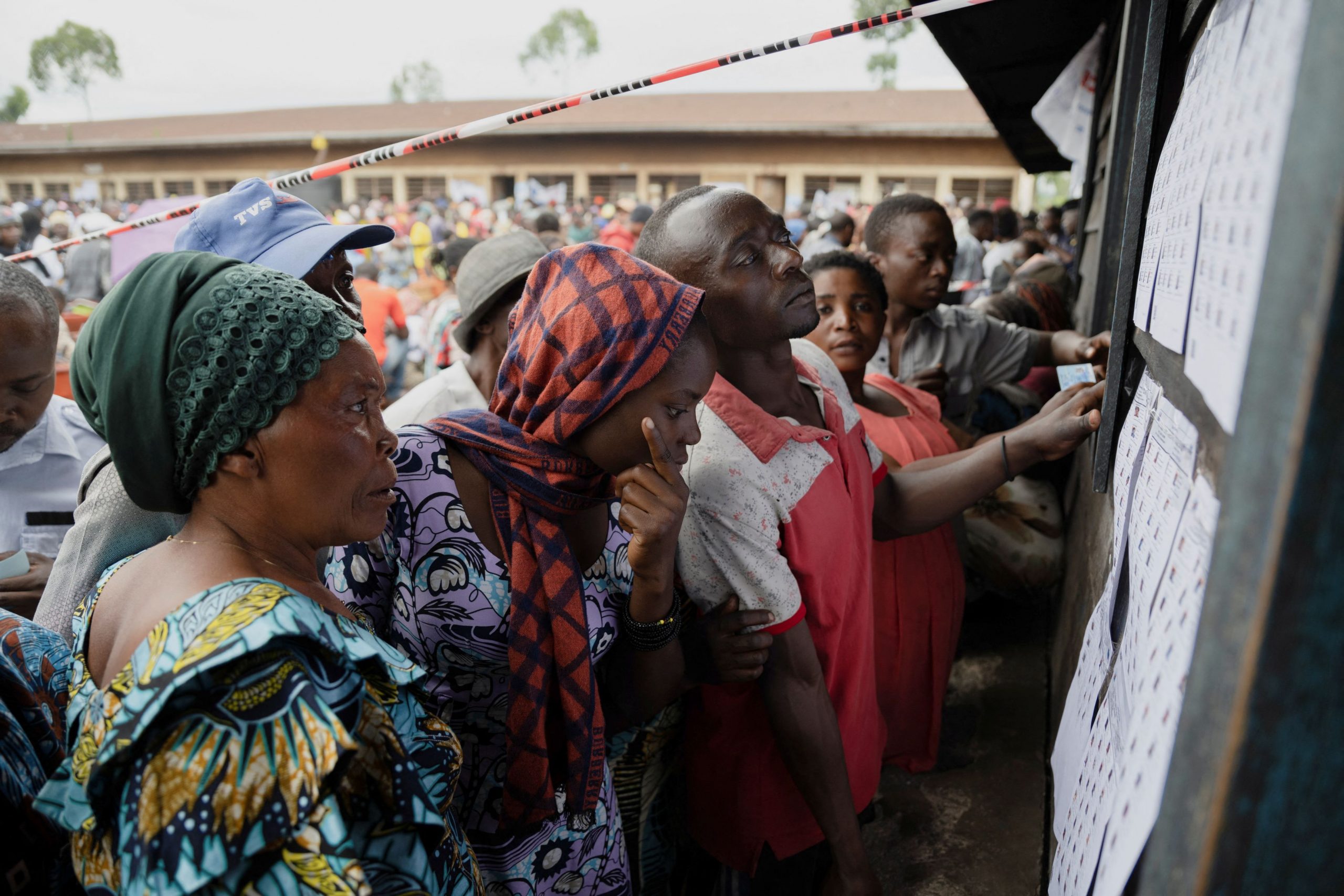KAMPALA, Uganda—Voters in the Democratic Republic of Congo—a vast nation that holds many of the minerals needed to build electric cars, smartphones and other devices central to modern life—cast their ballots Wednesday in an election plagued by delays, protests and the war in the country’s east.
Polling stations in the capital Kinshasa and several other towns opened hours late because voting materials hadn’t been delivered. Congolese officials said they were likely to extend voting in some districts to Thursday to make up for the delays.
In areas of Ituri and North Kivu, two eastern provinces that have seen some of the worst rebel fighting, police and soldiers fired tear gas to disperse protesters who said they were prevented from casting their ballots because their names weren’t on the voting register.
President Felix Tshisekedi is squaring off with 19 opposition candidates, including the owner of one of Africa’s most successful soccer clubs, a Nobel Peace Prize winner and a former Exxon Mobil executive who is widely seen as the actual winner of the last presidential vote in 2018.
A poll released Tuesday by New York University’s Congo Research Group, a local nongovernmental organization and the Congo-based Bureau d’Études, de Recherche et de Consulting International forecast Tshisekedi as the clear winner, with 49.3% of the vote. Moïse Katumbi, a deep-pocketed former governor of the mining region of Katanga and the owner of the popular Tout Puissant Mazembe soccer club, comes in as a distant second, with 28.1% of the vote, followed by Martin Fayulu, the former Exxon Mobil executive, with 6.9%.
Denis Mukwege, a gynecologist who won the 2018 Nobel for his work with rape victims in eastern Congo, is expected to get just 0.7% of the vote, within the poll’s margin of error. According to Congo’s constitution, the candidate with the most votes becomes president, without the need for an absolute majority.
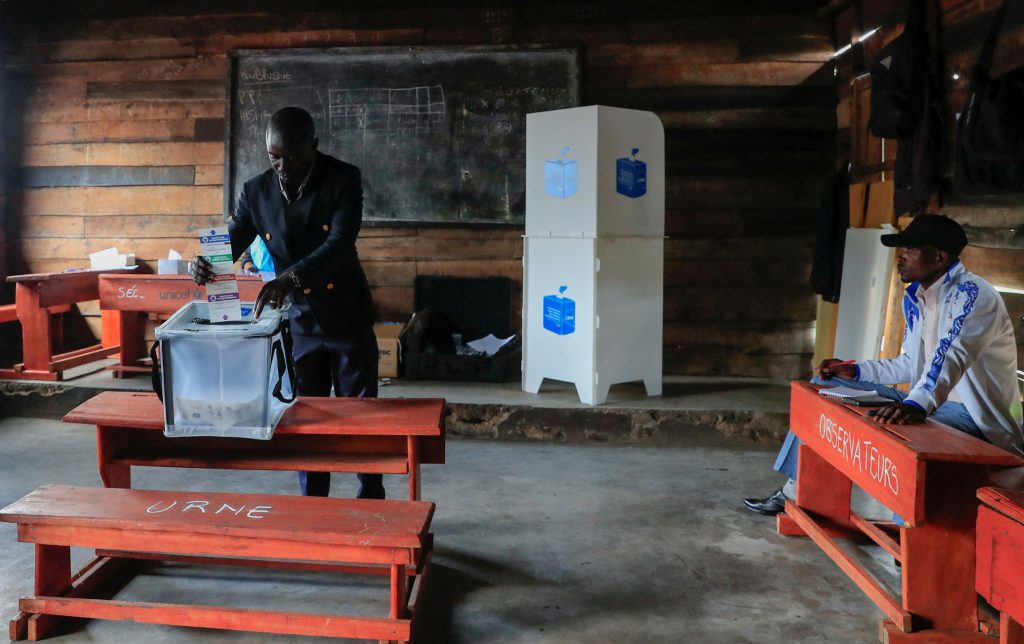
An internally displaced Congolese man casts his ballot at the Kanyaruchinya polling centre, during the Presidential election, at the Kanyaruchinya site for displaced people, in Nyiragongo territory, near Goma in North Kivu province of the Democratic Republic of Congo December 20, 2023. REUTERS/Thomas Mukoya
Katumbi’s party, Together for the Republic, said Wednesday that logistical issues, including late opening of polling stations, would taint the outcome of the vote. Casting his ballot in the mining town of Lubumbashi, Katumbi urged supporters to stay at their polling station and monitor tallying. The electoral commission said it had registered 44 million voters, who could cast their ballots at 75,000 polling stations across the country.
“We must monitor the results of each polling station, and we must display the results as well,” Katumbi said. Fayulu and Mukwege also denounced what they said were voting irregularities.
Partial results from the 2018 election that were leaked to the Congo Research Group showed Fayulu as the surprise winner of that vote, but the electoral commission declared Tshisekedi, the son of a longtime opposition leader, as president-elect.
The 60-year-old Tshisekedi spent the first years of his presidency in an awkward power-sharing arrangement with the party of his predecessor, Joseph Kabila, who was banned by the constitution from seeking a third term. He has walked a fine line in the escalating global power competition, voting alongside the U.S. to condemn Russia’s invasion of Ukraine but also maintaining a close relationship with his country’s biggest trading partner, China, whose companies run many of Congo’s largest cobalt and copper mines.
The results of this year’s election, which are due by Dec. 31, will reverberate far beyond Congo’s borders at a time when the fighting in the east has been at its worst in years.
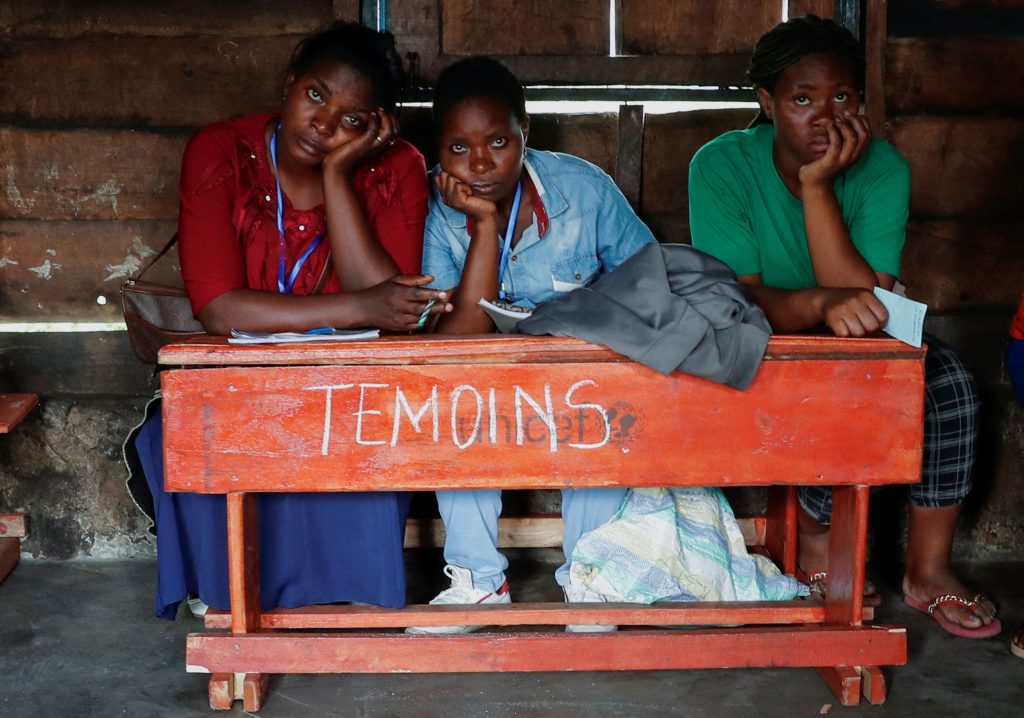
Internally displaced Congolese witnesses sit inside the voting station at the Kanyaruchinya polling centre, during the Presidential election, at the Kanyaruchinya site for displaced people, in Nyiragongo territory, near Goma in North Kivu province of the Democratic Republic of Congo December 20, 2023. REUTERS/Thomas Mukoya
Ugandan troops are currently battling alongside Congo’s weakened army against Islamic State-affiliated militants that have been staging deadly attacks as far away as the Ugandan capital Kampala. The U.S. and the United Nations, meanwhile, have accused Rwanda of backing another rebel group, M23, which over the past year has captured swaths of territory and prevented more than 1.5 million people from registering to vote. A third neighbor, Burundi, also has soldiers in eastern Congo.
U.N. experts say all three countries—Uganda, Rwanda and Burundi—have benefited for years from smuggling Congo’s gold, tantalum, coltan and other minerals across their own borders.
At his rallies, Tshisekedi has directed his ire at his Rwandan counterpart, Paul Kagame, comparing him to Adolf Hitler and saying that he would ask parliamentary approval to invade Rwanda if Kigali doesn’t end its support for M23.
“I will respond to any aggression,” he told cheering supporters in a working-class district of Kinshasa earlier this week. “Paul Kagame can play with anyone but not with Tshisekedi.”
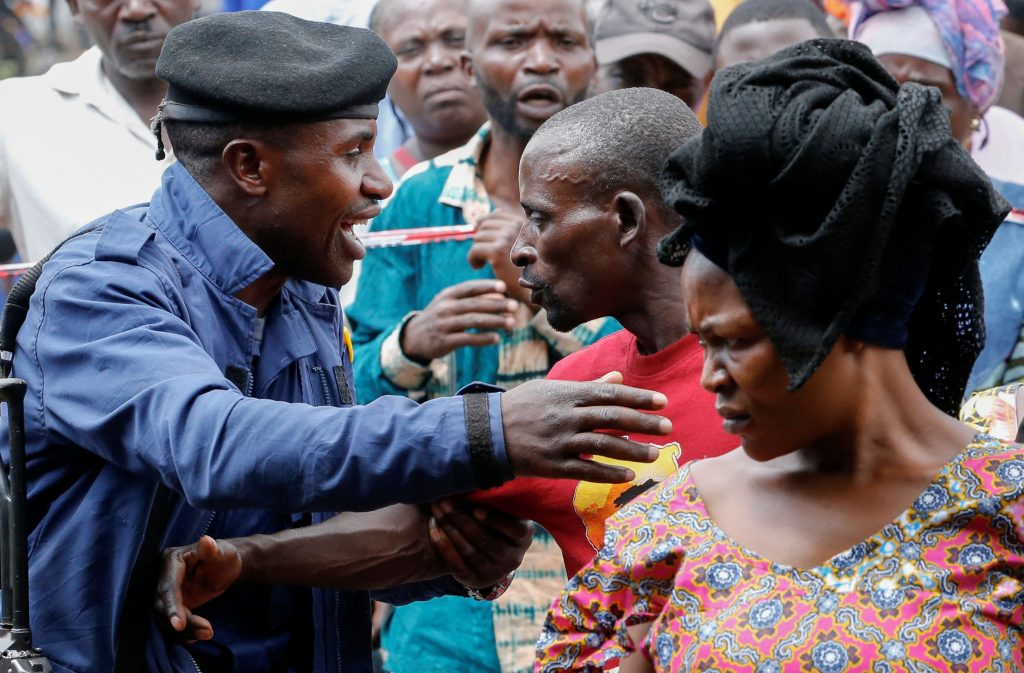
A Congolese police officer controls internally displaced Congolese people before they vote at the Kanyaruchinya polling centre, during the Presidential election, at the Kanyaruchinya site for displaced people, in Nyiragongo territory, near Goma in North Kivu province of the Democratic Republic of Congo December 20, 2023. REUTERS/Thomas Mukoya
The comments came days after the U.S. helped broker a cease-fire between M23 and other local militias that is due to expire on Dec. 28.
Spokespeople for the Rwandan government, which has denied supporting M23, didn’t respond to requests for comment. A spokeswoman for Kagame on social-media platform X, formerly Twitter, recently called Tshisekedi’s statements “a loud & clear threat.”
With their country consistently rated one of the most corrupt in the world, most of Congo’s 100 million people have seen little benefit from the mineral riches being unearthed from their soil, or the 6.7% economic growth the International Monetary Fund forecasts for 2023. Since the start of the year, the Congolese franc has lost more than a third of its value against the dollar.
The U.N. says some 26 million Congolese are facing food shortages—the worst hunger crisis in the world—and an estimated 6.9 million have had to flee their homes, many of them several times. In 2021, Tshisekedi put the provinces of Ituri and North Kivu under military rule, replacing elected officials with military commanders, suspending civilian courts and putting in place a dusk-to-dawn curfew.
But the measures have done little to improve security. Amnesty International estimates that M23 and other militias have killed around 4,000 civilians since mid-2021.
Despite the violence, the U.N. plans in April to start withdrawing a 14,000-troop-strong peacekeeping force that has been stationed in eastern Congo since 1999. Tshisekedi this year asked the Blue Helmets to leave, saying that they have failed to stop the war.
“This is a very important election for the stability of the entire region,” said Robert Tabaro, an assistant lecturer at Kyambogo University in Kampala. “The fact that you have armies from Uganda, Rwanda and Burundi all active inside Congo, makes the country a potential powder keg.”
Ugandan President Yoweri Museveni said Wednesday his military had launched a series of airstrikes against the Islamic State-affiliated Allied Democratic Forces in eastern Congo, two days after the militants killed 10 people in an attack on a Ugandan village close to the border.
In Kasindi, a town on Congo’s border with Uganda that is close to areas controlled by M23, Alphonse Muhindo said earlier this week that election officials never turned up there.
“I would have loved to vote, but they did not register me,” Muhindo, a supporter of Mukwege, said in a phone interview.
Blaming staff shortages, the Carter Center, one of the few international bodies monitoring the vote, has deployed observers in just 11 of the Congo’s 26 provinces. The European Union last month canceled a planned observation mission, citing technical constraints beyond its control, without giving more details. This week, it warned about allegations of serious human-right violations and other abuses in the run-up to the election.
“Ethnic tensions are running high, and social frustrations combined with a nontransparent electoral process are putting the country on the verge of huge security risk,” said Christian Géraud Neema Byamungu, a Congolese analyst with Washington-based Center for Strategic and International Studies. “We might find ourselves in a serious mess.”
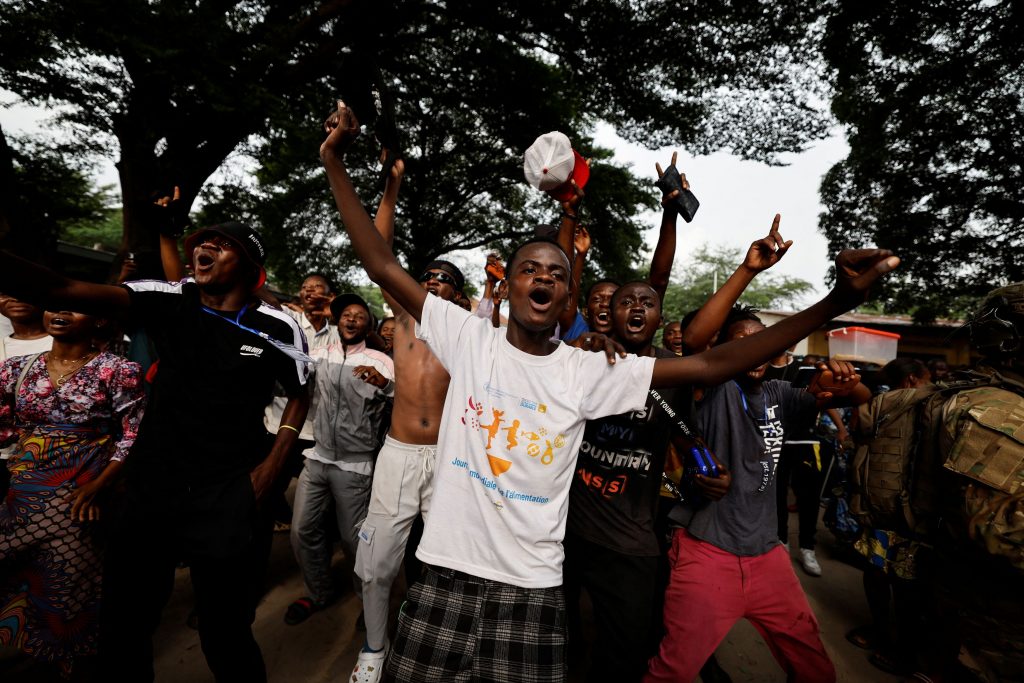
Supporters of Democratic Republic of the Congo’s President Felix Tshisekedi cheer for him, after he cast his vote at a polling station, during the presidential election, in Kinshasa, the Democratic Republic of Congo December 20, 2023. REUTERS/Zohra Bensemra
Write to Nicholas Bariyo at nicholas.bariyo@wsj.com
